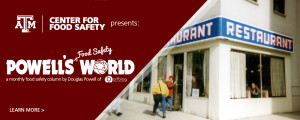There’s a lot of things to be seen in the middle of the night.
 Like all the food service trucks arriving at restaurants.
Like all the food service trucks arriving at restaurants.
Do consumers know where their food comes from? Do restaurants?
These are the things I look for.
• When I order meat and the server asks, how would you like it done, I always say the appropriate temperature. Only once over the past decade has a server been able to say, we can do that, and pulled out a tip-sensitive digital thermometer she carried around. I returned to that establishment.
• If the restaurant or market advertizes their food as local/natural/sustainable/organic/GE free/wild seafood, etc., I ask, how is that verified? Is there any testing for microbial food safety?
• Inspection reports are only a snapshot in time, but patterns can be detected over time. Recurring problems mean, go somewhere else.
• When diners ask to take leftovers home, does the restaurant take the remains to the kitchen (bad) or bring a clamshell to the table for the diner to take care of her own food (good). And maybe some food safety stickers on that clamshell with date, time and reheating guidelines. It has been done.
 d• A restaurant that cares about food safety will have its own auditors and secret diners, to ensure that what management says is happening with front-line servers.
d• A restaurant that cares about food safety will have its own auditors and secret diners, to ensure that what management says is happening with front-line servers.
• Does management support food safety with rapid, reliable, relevant and repeated food safety information so front-line servers can at least attempt to answer basic food safety questions?
•Do staff have access to the proper tools for proper handwashing – vigorously running water, soap and paper towels?
• Are foods properly stored and thawed (this appears in restaurant inspection reports routinely)?
• Are steps taken to prevent cross-contamination (also shows up repeatedly in restaurant inspection reports)?
• What’s in that dip, has become my standard question at many Australian restaurants. Usually they use raw eggs, and the outbreaks keep piling up. I choose something else.
• Raw produce is problematic. Does that sandwich have raw sprouts? Where did that lettuce or spinach come from? Was it grown with good agricultural practices because washing ain’t going to do much?
• Are employees vaccinated against Hepatitis A. Do employees work when they are sick with norovirus (happens every week somewhere in the U.S.)?
• Does the restaurant welcome questions and support disclosure systems?
That’s a lot of questions when I just want to go out on the town with Amy.
But I ask these routinely and learn a lot. Curiosity has its benefits.
The interested public can handle more, not less, information about food safety. The best restaurants will not wait for government; they will go ahead and make their food safety practices available in a variety of media and brag about them — today.
Dr. Douglas Powell is a former professor of food safety who shops, cooks and ferments from his home in Brisbane, Australia.
